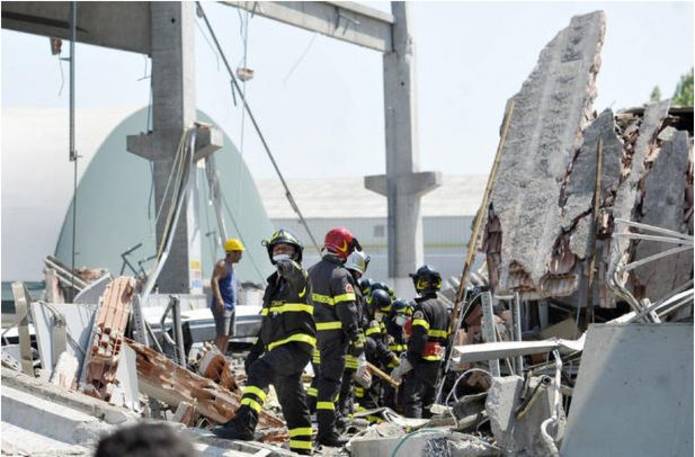


ROME - Bless her, Mamma RAI does her best (this maternal image is how the Italians call their state-owned radio-TV network, akin to the Brits calling the BBC "Auntie"). Here she was at 1:30 pm today, burbling on about the wonders of Emilia-Romagna's charming little towns redolent with history and art, terrific food, fabulous spas with natural hot springs, welcoming hotels. All true, but trouble is, for the previous half hour Mamma RAI's children had been listening to the heart-rending accounts of the continuing earth tremors in exactly that region, where 10% of this summer's tourist bookings have already been cancelled. One can sympathize with the hotel people, but when they blame the foreign media for the cancellations, they are wrong - it is the event, not the reporting of it, that is terrifying, and not only to potential tourists.
The human cost of the relentless earthquakes is almost beyond tally. There is the death toll (7 a week ago after the first tremor, 17 this week after the second tremendous quake), but also the life toll - the terror that seeps into a soul awakened at 11 pm, as were those in the towns near Modena last night, by a new cycle of tremors. On Thursday alone 101 tremors rocked the provinces of Modena, Ferrara and Mantua in the course of 24 hours. Today, Friday, at 9 am a drummer with the Modena City Ramblers, who has been sleeping in his car with his family for the past 15 days, was driving his children to school at Cavezzo when his automobile bucked up like a bronco, with its wheels whirring futilely, as a new after-shock struck. In front he watched a factory building crumple down "as if it were made of chocolate."
And it is not only terror seeping: Emilia-Romagna lies atop an ancient sea bed, so the subsoil is of sand, or was, and in some kitchens that muddy sand has bubbled up from the sub-soil to cover the kitchen floor tiles with a foot of filth.
"You have to arrive at dawn to understand how bad things are," said one reporter. "That's when you realize how many people are sleeping in their cars." How many? The official count of the homeless stands at 15,000, but some 200,000 are in fact sleeping in their cars and in their summer camp-out tents by their houses "so that we can keep an eye on the house." Not all the victims have been counted. As one woman wept to a RAI reporter, "Our town is so small, not a single person has arrived to see about us, but we've been sleeping outdoors now for 12 nights - I can't go on!"
The shaking of the earth is ghastly, but man adds his gruesome cruelty: cars with loudspeakers have been driving down main streets to advise residents that they must leave their homes for safety's sake - only to find that these self-styled life-savers are nothing but looters. At Mirandola three looters were arrested so far. For these warped human beings wearing fake (or stolen) uniforms, the quake is an occasion for profit. Thus ever, and when I interviewed Irpinia earthquake rescue volunteers in 1981 they told me that, on arriving at night, they found the bodies of two looters strung up from trees.
It is not to diminish the physical or psychological toll upon the inhabitants to speak of the costs to the economy of these almost two weeks of earthquakes. Emilia-Romagna alone accounts for 1% of Italy's GNP, and with over E 134 million annually, is Italy's fourth most productive region, behind only Lombardy, Lazio and the Veneto. These flatlands are home to some 700 cattle farms, whose milk goes into the world-famed and super-healthy Parmigiano and Padana cheeses for eating and grating. In the case of the Parmigiano producers some 633,700 huge wheels of cheese in various stages of aging were tumbled onto the floors as scaffolding collapsed. So far the losses are calculated at E 150 million ($186 million), surely an underestimate, even as shark-like buyers are snapping up Parmigiano Reggiano at E 2 ($2.5) per kilo, or under one-tenth of its retail cost. The future looks grim, for many producers used their current production as a kind of bank guarantee for loans; and in the meantime one out of every five cows is without forage and hence is going hungry, just as are the townspeople in the zones worst struck.
Not only agriculture is compromised. The word going around is that it's back to work as usual, and even department stores have set up stalls outdoors. But because jerry-built factories collapsed just this week on top of workers, killing ten, workers in those big industrial establishments which were not destroyed are living and working with fear. "I used to concentrate on the conveyor belt. Now I'm looking up every other minute to see if the roof is going to fall on me," said one worker. It made a footnote that one cynical industrialist was caught packing up the machine tools for his two carpentry shops to "delocalize" to Romania, until a trade union delegation from Bologna physically blocked his trucks.
Anyone able to make a contribution of E 2 ($2.50) can send an SMS to +39 45500, the special number for the Italian Civil Protection agency. [2] And the Ferrari motor company at Maranello is holding a world-wide auction next week on its site ferraristore.com to raise funds for families of victims. The auction winner will own a 599xx Evo sports car valued at E 1.3 million ($1.6 million).
Source URL: http://newsite.iitaly.org/magazine/events/reports/article/emilia-romagna-nightmare-continues
Links
[1] http://newsite.iitaly.org/files/terremoto-emilia-scosse1338581216jpg
[2] http://www.protezionecivile.gov.it/jcms/en/homepage.wp;jsessionid=842C5C48CDF69DD1410E11F9A565726F